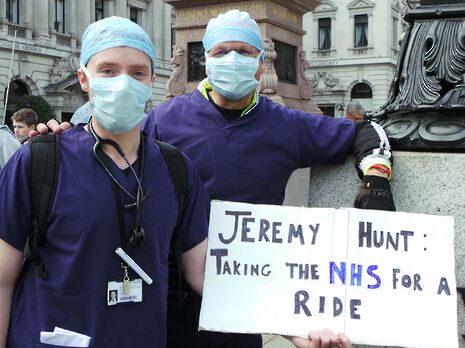Junior doctors’ strikes are a symptom of an ailing NHS
Complaints over working conditions for junior doctors are just the tip of the iceberg

Last month, junior doctors in England went on strike for the first time in more than four decades. Up to 38,000 medics joined the picket lines across the country in a long-running dispute over new contracts, which could see changes to pay for weekend work, career progression, and the safeguards which protect doctors from being overworked. As a consequence of these strikes, some 3,000 operations had to be cancelled.
This no doubt inconvenienced countless patients who would have taken time to make preparations before being turned away on the day. Strikes are taking place again this month, but whereas last time industrial action did not interfere with emergency care provision, on 10th February there was a full withdrawal of labour between 8am and 5pm. I am sure even those patients whose care has been disrupted by these strikes can sympathise with the predicament of the hard-working clinicians up and down this country.
Without a shadow of a doubt, our medics are some of the most dedicated, diligent individuals in society, often clocking hours many times over the national average and bearing more than their fair share of unsociable hours, causing them to miss out on valuable time with family and friends.
What is clear from these strikes is that doctors have considerable bargaining power. After all, we all rely on their services more than once in our lifetime – whether that be at childbirth, for a check-up at our local GP, or in the last days of a terminally ill loved one. Their calls are more than certain to turn a few heads; the prospect of unmanned hospital desks is not a prospect many (or any) of us anticipate without an ominous feeling.
It is likely strikes may become commonplace, as both sides in the negotiations – the British Medical Association (BMA) on the one side and the government on the other – continue to be immovable in their demands. It is crucial, therefore, that when doctors go on strike this week and in the future we spare a thought not only for the doctors and their patients but also for those countless, unnoticed champions without whom doctors’ achievements in wards and clinics would be impossible.
This includes but is not limited to the overworked receptionists and sleep-deprived nurses in hospital wards, or porters who pace up and down corridors to deliver blood specimens for clinical analysis. They are the unsung heroes of our NHS; their vital contribution so often goes unacknowledged. Their protestations about hours or working conditions are, however, left unanswered, if at all heard.
Indeed, in May last year, nurses threatened to go on their first strike in their union’s 100-year history to fight the government’s proposed changes to mould their promised seven-day NHS vision. Last month, nurses, healthcare assistants, porters and other members of the NHS workforce voiced their solidarity with junior doctors over strike action. They sympathise with their junior doctor peers not only in principle but practically speaking; they experience similar if not more testing working conditions on a daily basis.
A survey of hospital porters in Scotland revealed that 60 per cent believed they were running a service with fewer than the necessary staffing levels. One porter spoke of working on a zero-hours contract for six years and being paid less than contracted staff doing the same job; another recounted working around 22.5 hours overtime per month. They are routinely asked to undertake tasks for which they have no training – be those manual handling or security patrols.
Research has shown that unsocial hours reduce life expectancy and have an impact on one’s family and social wellbeing. In stretching staff over the course of seven days instead of five – and paying less for the extra hours – all practitioners, not only junior doctors, are affected.
One stark statistic illustrates this – in 2015, more than 10,000 nurse vacancies were left unfilled in London alone. This means that nurses currently employed in trusts across the country are doing the equivalent of two or three people’s work by staying late and missing out on breaks. One in three nurses does more than their contracted hours, with more than 7,000 still working for more than two hours on average after they should have gone home. These nurses who do unpaid overtime – approximately a third of the sector – risk not only their safety but that of their patients.
When these debates about working hours and conditions recur, as they almost certainly will over the coming months and years, we need to remember that the NHS – just like the human body to which it tends – is a holistic, interrelated organism. Nurses, technicians, porters, cleaners, pharmacists, phlebotomists, doctors, and many others play an essential part throughout the diagnosis and treatment processes and everything in between. If the ailments of our health service are to be remedied, we need a wholesome approach which addresses all of its sub-sectors and encompasses all of its staff, from doctors to nurses to assistants.
 Interviews / ‘People just walk away’: the sense of exclusion felt by foundation year students19 April 2024
Interviews / ‘People just walk away’: the sense of exclusion felt by foundation year students19 April 2024 News / Climate activists smash windows of Cambridge Energy Institute22 April 2024
News / Climate activists smash windows of Cambridge Energy Institute22 April 2024 News / Copycat don caught again19 April 2024
News / Copycat don caught again19 April 2024 News / John’s spent over 17 times more on chapel choir than axed St John’s Voices22 April 2024
News / John’s spent over 17 times more on chapel choir than axed St John’s Voices22 April 2024 News / Fitz students face ‘massive invasion of privacy’ over messy rooms23 April 2024
News / Fitz students face ‘massive invasion of privacy’ over messy rooms23 April 2024





